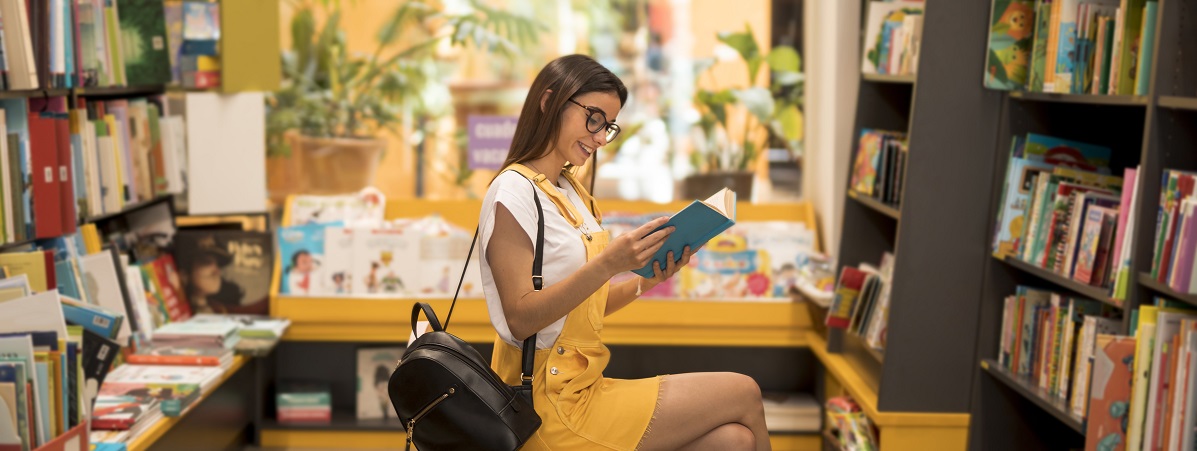IELTS Cue Card شماره 26 : توصیف جایی برای خواندن و نوشتن
IELTS Cue Card شماره 26 :
یکی از سوالهای رایجی که در بخش اسپیکینگ آیلتس (IELTS Speaking) پرسیده میشه توصیف جایی غیر از خانه یتان است که در آن به خواندن و نوشتن می پردازید. سوالی که از شما پرسیده میشه اینه:
IELTS Cue Card: Describe a place that isn’t your home where you read and write
برای پاسخ به این سوال باید سه موضوع را در نظر داشته باشید:
| کجاست | Where it is |
| چه شکلی است | What it is like |
| هر چند وقت یکبار به آنجا می روید | How often you go there |
و توضیح دهید که نسبت به آن مکان چه احساسی دارید.
در ادامه با انواع سوال هایی که در بخش سوم پرسیده میشود آشنا می شویم و بعد چند نمونه جواب را برای هر بخش و هر سوال بررسی میکنیم و لغات مهم و کاربردی استفاده شده در جواب را با هم مرور می کنیم.
مطالعه ی IELTS Cue Card شماره 26 به شما کمک میکند تا خود را برای بخش اسپیکینگ آیلتس آماده کنید و دایره ی لغات مورد نیاز برای این بخش را افزایش دهید.
سوالات بخش 3
What do you think is more important: reading or writing?
به نظر شما کدام مهم تر است: خواندن یا نوشتن؟
Who needs to have good writing skills?
کدام دسته از افراد نیاز به داشتن مهارت نویسندگی دارند؟
Where can people get more information from: words or pictures?
افراد از کدام یک اطلاعات بیشتری به دست می آورند: لغات یا تصاویر؟
At what age should children start to read?
کودکان از چه سنی باید شروع به خواندن کنند؟
پاسخ نمونه بخش 2
I’ve tried a number of places such as coffee shops and libraries, but nothing has worked quite as well as the park. The one I love to go to the most is about a kilometer away from my home.
I’ve found that coffee shops are too loud, with the clinking of crockery and constant ambient chatter that steals my focus. Libraries, on the other hand are too quiet. I find the level of silence in these places almost unsettling and feel really uncomfortable making any amount of noise, no matter how small, for fear of disturbing someone else.
A friend recommended I try the park instead. I live in a fairly green city with lots of parks to choose from, but this one is on a hill and overlooks the city. There’s a little bit of ambient noise from the city which I find to be soothing, but it’s overall a fairly peaceful and relaxing place.
I’ve been studying a lot lately, and I’ve had to go through quite a lot of written material. I’m the kind of person that likes to make a lot of notes because it helps solidify concepts and memorize material.
I’ll often go there with my backpack with everything I need, together with a few snacks to stave off any sugar cravings I may get while studying. If it’s been dry for a few days, I’ll often choose to lay down on the grass, but even the slightest hint of rain the day before will make this unpleasant, and so on these days I’ll spread out on a bench away from other people.
At the moment I’m usually going several times a week, whenever I feel like I need to get out of the house and have a change of scenery. This is working really quite well right now because it’s summer and quite warm, but I’m not really sure what I’m going to do as winter rolls around. There aren’t any enclosed spaces in this park so I think I’ll have to find somewhere equally peaceful or just suck it up and stay at home to study.
لغات و اصطلاحات پاسخ نمونه
Clinking (noun – جلنگ جلنگ صدا کردن)It describes the sound of glass or metal objects hitting each other. It’s a short, high-pitched ringing sound.
Example: All you hear is the clinking of glasses at the restaurant.
Crockery (noun – ظروف سفالی)Plates, cups, bowls, etc that are used for serving food and drinks, especially if they’re made of china.
Example: The restaurant uses the finest of crockery.
Ambient (adjective – محیط)Something that’s ambient exists around you, such as air, lighting, noise, temperature, or other conditions.
Example: The ambient sounds helped me fall asleep.
Steals (verb – دزدیدن، جلب کردن)To steal something is to take something or to draw attention unexpectedly.
Example A: She stole my attention when she walked in the room.
Example B: My phone was stolen in Belgium.
On the other hand (idiom – از سوی دیگر)It’s a phrase used for giving two different opinions about something, and is different from the first thing you mentioned.
Example:My boyfriend likes all kinds of food, but I, on the other hand only like cheeseburgers and tacos.
Unsettling (adjective – مشوش کننده)Something that is unsettling makes you feel nervous, confused, or upset.
Example: I received the unsettling news that I may lose my job next month.
Solidify (verb – محکم کردن)To solidify something is to make it more certain or definite.
Example: The company has solidified their position in the market.
Stave off (phrasal verb – مانع شدن)If you stave off something, you stop it from happening particularly if it’s a bad situation. It’s usually only temporary.
Example: We’re hoping to stave off all these difficult decisions until November.
Spread out (phrasal verb – پهن شدن)In this case it means to cover a larger area. People and things can be spread out.
Example: Dark clouds began to spread out across the sky.
Change of scenery (phrase – تغییر مکان برای سلامتی)It means a period of time that you spend in a different place in order to feel better or more healthy.
Example: I needed a change of scenery from the city.
Rolls around (phrasal verb – فرا رسیدن)If a season, holiday, or regular event rolls around, it arrives or it happens.
Example: She wondered if he would still be there when spring rolled around.
Suck it up (idiom – سوختن و ساختن)It’s used for saying that someone has to accept a difficult or unpleasant situation even if they don’t want to.
Example: I hated having to work two jobs, but with three small kids at home I just had to suck it up.
پاسخ نمونه بخش 3
What do you think is more important: reading or writing?
به نظر شما کدام مهم تر است: خواندن یا نوشتن؟
I think both are extremely important, but if I had to pick one I’d say reading is marginally more important.
I used to live in a country where I didn’t speak the language. In the early days I was having a hard time reading product labels in the supermarket. It was obvious what some things were just from the product packaging, but for others it’s less obvious. I made quite a number of mistakes and bought sour cream instead of normal cream more times than I can count. Learning to read these product labels was really quite beneficial. Learning to read some other things like menus was also very useful too. However, I don’t think I can recall a single time I had to write anything in that language though.
I think a lot of people neglect their writing skills though. I think this is because consuming a language is so much simpler than producing it, which is why a lot of people are able to listen and read significantly better than they can write and speak.
لغات و اصطلاحات پاسخ نمونه
Marginally (adverb – خیلی کم)If something is marginal there’s only a slight difference.
Example: Revenues were only marginally better than last year.
Hard time (noun – سختی کشیدن)A hard time is a difficulty that can be overcome with effort.
Example: We had a hard time getting here.
Who needs to have good writing skills?
کدام دسته از افراد نیاز به داشتن مهارت نویسندگی دارند؟
Anybody that writes for a living, or as part of their job.
Journalists often have to convey ideas to their audience in a way that’s easily digestible. Sometimes the subject matter might be quite difficult and complex, and explaining a story in just a few hundred, or few thousand words can be a hard undertaking. They need to have excellent writing skills in order to achieve this goal.
Authors are another example. The success or failure of their book will largely ride on their ability to articulate themselves clearly and in a way that their readers find compelling. While some people do read textbooks, which are sometimes a little bit dry, most read for leisure and want the story to flow without having to deal with a poor writing style.
A lot of people have to write emails, and while they can be less formal, oftentimes they need to be unambiguous because miscommunications can lead to confused customers and failed business deals.
لغات و اصطلاحات پاسخ نمونه
Digestible (adjective – قابل هضم)Something that’s digestible is easy to understand.
Example: The report was easily digestible and I could read it in my lunch break.
Subject matter (noun – موضوع مورد صحبت)The things that are being talked or written about, or used as the subject of a piece of art, etc.
Example: The subject matter of the textbook was carefully chosen to appeal to students.
Undertaking (noun – تعهد)An undertaking is a job, task, or piece of work that someone has agreed to do.
Example: This is an enormous undertaking and is taking longer than I thought it would.
Ride on (phrasal verb – به چیزی وابسته بودن)If something depends on something for success or an outcome, it rides on it.
Example: Whether or not I go to college rides on my getting a scholarship.
Articulate (adjective – ماهر در صحبت)If you can articulate yourself, you are able to express your thoughts, arguments, and ideas clearly and effectively.
Example: She is a highly articulate woman.
Compelling (adjective – جذاب)Something that’s compelling is interesting or exciting enough to keep your attention completely.
Example: The story was really compelling.
Unambiguous (adjective – بدون ابهام)Something that’s clear and with only one possible meaning.
Example: Many words in English have many different meanings and are rarely unambiguous.
Where can people get more information from: words or pictures?
افراد از کدام یک اطلاعات بیشتری به دست می آورند: لغات یا تصاویر؟
There’s a maxim that a picture is worth a thousand words, but I disagree. I think pictures are a good complement to prose but rarely a good substitution.
If someone is trying to glean information from a picture alone, they’ll have to spend a lot more time studying the picture and making inferences, which might be quite wrong. However, if someone is reading an accurate description instead, they’re going to more precisely understand the message that’s intended.
However, I think the best is to have both. Words and pictures really do go hand in hand, and a good picture can add so much value to a piece of writing.
لغات و اصطلاحات پاسخ نمونه
Maxim (noun – گفته اخلاقی)A maxim is a phrase or saying that includes a rule or moral principle about how you should behave. It can also be a brief statement of a general truth.
Example: She lived by the maxim, “Do right, risk consequences.”
Prose (noun – نثر)Prose is written language in its ordinary form rather than poetry.
Example: I’ve always preferred reading prose to poetry.
Glean (verb – به سختی اطلاعات جمع کردن)To glean information is to collect information in small amounts and often with great difficulty.
Example: From what I’ve been able to glean, the news isn’t good.
Inferences (noun – استنتاج)A guess that you make or an opinion that you form based on the information that you have.
Example: The clear inference is that the universe is expanding.
Hand in hand (idiom – دست در دست)If something goes hand in hand, it means two things are closely connected or related.
Example: Cookies and milk go hand in hand.
At what age should children start to read?
کودکان از چه سنی باید شروع به خواندن کنند؟
I’m not sure there’s a set age, but I’d say that they should start reading as early as possible, and the sooner the better.
Reading is a skill that takes many years to master and if they begin early, they’ll be a few steps ahead of their peers when they start school.
I remember when I was in primary school, a lot of the other kids struggled to read anything more than a paragraph or two, but my friend, who grew up in a family of readers, excelled.
I also think it’s important for people to be able to read things out loud. It’s a skill that’s rarely practiced and often woefully undeveloped in many people. Sometimes people have to read out loud at a meeting or a wedding and they struggle immensely. A little bit of regular practice would go a long way.
لغات و اصطلاحات پاسخ نمونه
The sooner the better (phrase – هر چه زودتر بهتر)As soon as possible; right away.
Example: I want you to get rid of those people, and the sooner the better.
Master (verb – یاد گرفتن)To master something is to learn how to do something well.
Example: She lived in Italy for several years but never quite mastered the language.
Peer (noun – همتا)A peer is a person who is the same age or has the same social position or the same abilities as other people in a group.
Example: Do think it’s true that teenage girls are less self-confident than their male peers?
Excel (verb – برتری داشتن)To excel at something is to do it extremely well.
Example: She always excelled at languages.
Woefully (adverb – به شدت)It’s used to emphasize how bad a situation really is.
Example: The school’s textbooks are woefully out of date.
Immensely (adverb – بی اندازه)Used for emphasizing what you’re saying. Another word for it would be very or extremely.
Example: He was immensely popular.
Go a long way (verb – برای مدتی موثر بودن)If something would go a long way it would be adequate for a while or to a certain extent.
Example: A few minutes of studying every day will go a long way.
اگر مطالب IELTS Cue Card شماره 26 برایتان مفید بود و هنوز درمورد بخش اسپیکینگ آیلتس یا سایر بخش های این آزمون سوال یا نیاز به تمرین بیشتر داشتید، پیشنهاد میکنم در دورهی فشرده ایلتس شرکت کنید تا با بهره مندی از کمک های اساتید باتجربه ی آیلتس، نمره ی ایده آل خود را از این آزمون سرنوشت ساز بدست آورید.
اگر هم قصدتان توانایی مکالمه به زبان انگلیسی است به شما شرکت در دورهی مکالمه زبان انگلیسی آکادمی آنلاین 24talk را پیشنهاد میکنیم که با تمرکز بر روی تقویت مهارت مکالمه، دورههای خصوصی و نیمه خصوصی در سطوح مختلف برای شما زبان آموزان عزیز ارائه می کند.











